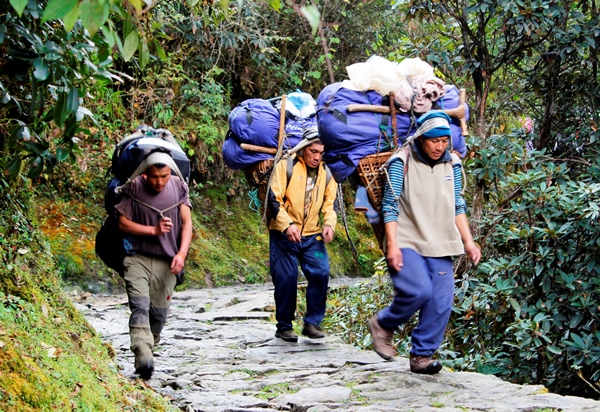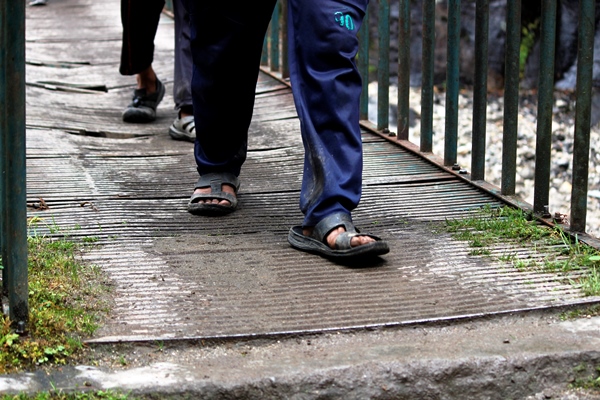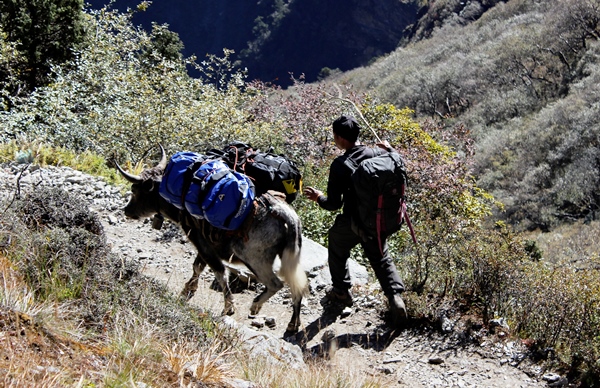
They trudge by you on the path, carrying packs much larger than your meager day pack, often wearing nothing more than flip flops or worn out tennis shoes on their feet. They hang out in the kitchens of the teahouses, eating plates of dal bhaat, playing cards and joking around. They are, for many people, a necessary component of a trek to Everest Base Camp or elsewhere in the Himalayas.
They are porters.
Unfortunately, they may also be underpaid and mistreated by trekkers who may not know any better.
I will admit I didn’t give too much thought to the plight of the Himalayan porters at the start of my trip. Our group was small and hired dzokyos (yak-like animals) to carry our gear so instead of porters we had a dzokyo “driver” and assistant. But then we got to Machermo and went to listen to a talk about altitude sickness at the International Porter Rescue Center. In addition to learning how to keep ourselves healthy as we get up to higher altitudes, we learned about some of the realities that porters face.
It goes without saying that being a porter is a grueling job, but there are some things we can do as trekkers to make their lives a little bit better.
Pay your porters fairly.
If you travel independently and hire a porter yourself, be sure to pay a daily wage plus the cost of three meals a day for your porter. If you travel with a group or book through a company, make sure that they are doing the same. I was surprised to learn that many companies only pay porters enough to cover their meals each day, which means if they don’t get a good tip at the end of the trip, they come away with nothing. Some teahouses help with this by offering free meals to porters, but you can’t assume this will be the case.
Keep an eye on the health of your porters.
It is easy to assume that your porters come from the mountain villages and are used to the high altitude, but in reality, many porters come from the lowlands. This means that they are just as susceptible to altitude sickness as we are. At the Rescue Center, they told us about a porter who was carried down the mountain to them by his fellow porters, so ill with altitude sickness that he had to be evacuated by helicopter. I later read the following on the blog of a volunteer doctor we met on the trek:
“When I got back to Machermo I arrived to find a porter sitting in our clinic room with oxygen levels in the 50s and a respiratory tract infection. His trekkers had left him, saying they’d see him in Namche the next day and only gave him half his pay. Unfortunately overnight he too developed pulmonary oedema. We were stuck in a tricky situation. Although normally porter treatment is free at the post, usually the trekking company would organise insurance. With all his trekkers departed we were a bit stuck. We could hire a horse but this would mean him getting very cold. Instead we used charity money to pay for his helicopter down to Lukla. He was deteriorating in front of our eyes at this altitude so I dread to think what would have happened if he had not been evacuated.”
Make sure your porters have appropriate gear.
Remember above I mentioned the porters trudging by you with nothing more than flip flops on their feet? Just because you see it, doesn’t mean it is okay – especially as you’re getting into higher altitudes and colder temperatures (or even snow!). Make sure your porters have good shoes, a warm jacket and gloves or a hat as necessary.

Talk to your porters.
Don’t be afraid to try to chat up your porters. Many will speak at least a little English and they can tell you all about the mountains, the villages and local religions and beliefs. Many also have a great sense of humor. Our dzokyo driver and assistant sat with us almost every night as we shared our photos and critiqued them and were completely enthralled. And while they only spoke a few words of English, they seemed to understand much of what we said, laughing at many of our jokes. It created a nice camaraderie that really added to the overall experience.
Don’t overload your porters.
Just because porters physically are able to carry up to 30 kilograms or more doesn’t mean they should. Limit your pack to about 15 kilos and fight the urge to ask your porter to double up to save money. Hire the extra porter instead.

Or, don’t use porters at all.
If you are traveling with a group, consider spending a little extra to hire dzokyos to carry your gear instead of porters. Or, if you feel up to it, simply carry your own gear (although I admit, I would not have been able to carry my 15 kilo pack the entire time!).
